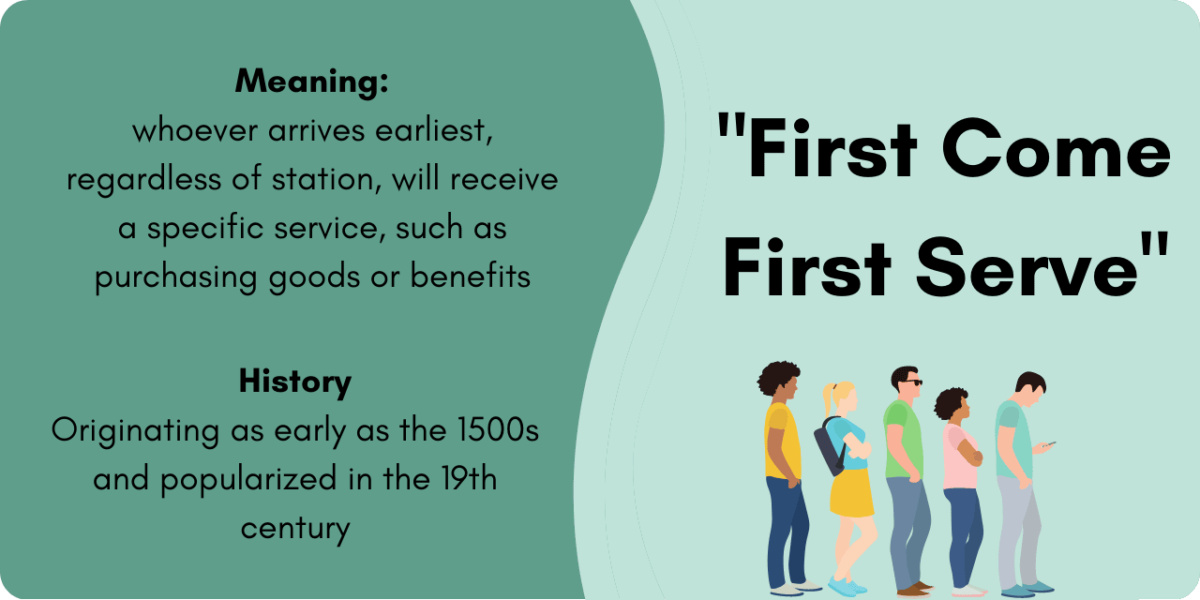- “First come, first serve” means that whoever arrives earliest, regardless of station, will receive a specific service, such as purchasing goods or benefits.
- This expression implies a limited quantity of goods available, so some may miss out if they do not arrive early enough.
- This version is a grammatically incorrect statement, as the proper usage should end with a “d,” as in “first come, first served.”
- The expression is only hyphenated when used as an adjective phrase before a noun.
- Originating as early as the 1500s and popularized in the 19th century, merchants used it to encourage a sense of urgency in customers while indicating they would treat all equally, avoiding favoritism.
Sometimes even popular expressions can confuse English language learners or battle native speakers. Other times, the phrase’s true meaning is different from what many people believe or at least has slightly different forms that can change the interpretation. One such expression is “first come, first serve,” which sometimes appears as the variant “first come, first served.”
We will examine each form of the phrase, evaluating the finer points in proper usage while investigating its historical background.
What Does First Come, First Serve mean?
Those who have goods or services for sale or items to give away free of charge often use the statement “first come, first serve“ when advertising so that the interested parties are imbued with a feeling of urgency, motivating them to act now and quickly if they wish to participate in an exchange.
The reason may be that supplies are limited, and the vendor understands that there will likely be a greater demand than what they can fulfill with their present quantities. This usage serves as both a warning to prospective consumers and a defense against the ire of others who may be unable to acquire their desired acquisitions, as the vendor can explain that they told consumers upfront that they should act quickly to avoid this occurrence.
Another purpose of the statement is to discourage favoritism, as some potential traders may use their celebrity or reputable status to cut in line or receive a commodity as a special favor. This phrase serves as a disclaimer to help vendors politely refuse any who try to use renown to their advantage.
The expression is, in actuality, an abbreviated form of a longer sentiment. “First come” means “the first people to come (or arrive),” while “first served” is short for “will be the first to receive service” or some variation of this idea.
Even today, some merchants use the expression as a gimmick to motivate shoppers to purchase goods, implying that limited quantities are available when that may not be the case.

First Come, First Serve Vs. First Come, First Served
While it is common to see the expression first come, first serve, it is an improper grammatical form. In reality, the phrase should include an additional “d” at the end of “serve,” converting it to the verb’s past tense.
Punctuation and Hyphenation Rules
Hyphenated or Not?
The statement generally functions as an adjective phrase in a sentence, modifying a noun. Interestingly, the phrase has rules governing when it should appear with hyphens as opposed to without. In general, you should use it without hyphens, although there is one specific instance in which the grammar sages dictate that dashes between each set of words is necessary — when the adjective phrase follows the noun it follows. The most common successive noun is “basis” although it is not the only option.
Here are a few examples to demonstrate how first come, first served can be used in each way, with and without hyphens as appropriate.
- The new Karate Bob action figure was available at the retail store, but only on a first-come, first-served basis.
There will be a lot of unhappy children once Karate Bob vacates the shelves, as this usage indicates is likely to happen. Note that here the phrase modifies the noun basis, and as basic grammar rules dictate, only adjectives modify nouns.
You may also note that this form is hyphenated because it modifies the noun “basis,” which follows the phrase.
- The Taylor Swift concert tickets were first come, first served, and Brianna was traumatized when she discovered they sold out within minutes.
Thanks to the artist’s immense popularity and likely a cadre of ticket bots, Brianna will never be the same; her teenage angst will boil over like a third-grade science fair volcano, scorching anyone in her path. Once more, “first come, first served” acts as an adjective, although in this case, it is a predicate adjective following a linking verb, as it modifies the subject “tickets.”
Here are a few more examples to assist with understanding its usage:
- We had better arrive at the venue early, as seating is first come, first served.
- Patrick felt nonplussed that he could not get a copy of the new game upon its release; he knew it was a first-come, first-served situation, but he camped out in line hours before the store opened!
- “Sorry, no more muffins left. First come, first served.”
Comma
You may also have noticed that there is always a comma between the first and the second part of the phrase, which is the proper way to punctuate the phrase.
The Origin of First Come, First Serve
It is generally agreed that the earliest variations of “first come, first serve” appeared in Geoffrey Chaucer’s Canterbury Tales, specifically within “The Wife of Bath’s Tale.” It was written around 1386 and appeared in the following form:
- Whoso first cometh to the mill, first grist.
Grist is the grain millers use to make flour, so the phrase indicates that whoever shows up first gets the grain.
However, it became more widely used in the 19th century, as vendors raced to encourage sales urgency, motivating consumers to act quickly before the stock was gone or through limited-time offers.
This practice continues today, to some extent, although you are just as likely to see a similar expression such as “act now, while supplies last!” or “Supplies are limited, order today!”
Other sayings share analogous meanings to “first come, first served”:
- The early bird catches the worm
- You snooze, you lose
- He who sleeps doesn’t catch any fish
- Success is for firstcomers
Similar Expressions
Among some other similar expressions, they most commonly heard would be the idiom “the early bird catches the worm.” In a nutshell, its means that being first increases your chances for success. A lesser-known phrase is “first among equals,” which is actually a translation from the Latin phrase “primus inter pares.” Slightly less relevant, it refers to someone or something having the highest status among its peers.
Further reading: here are some other great expressions that you can integrate into your writing:
Dog Whistle






